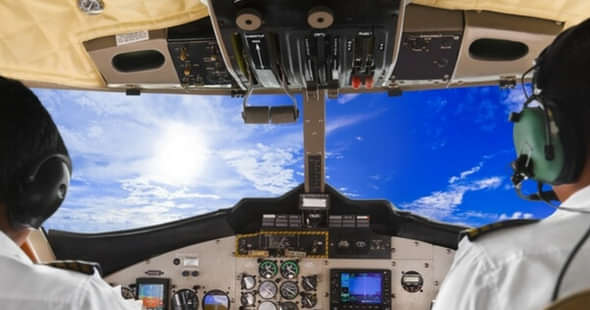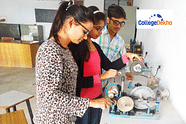For becoming a Commercial Pilot, the students need to get the license and start as a trainee. There are chances to become a Capitan by the time you turn 25 depending upon experience and skills.

Choosing a career as a Commercial Pilot is not only a challenging task but also a rewarding one. Piloting has always been considered to be one of the most exciting career choices and many students aspire to become pilots from very young ages.
A career as a Pilot not only offers high salaries but also thrilling experience and exposure. Usually, if you want to become a pilot, you need to start at the age of 17. For becoming a Commercial Pilot, the students need to get the license and start as a trainee. There are chances to become a Capitan by the time you turn 25 depending upon experience and skills.
| Table of Contents |
|---|
Who is a Commercial Pilot?
A Commercial Aircraft Pilot is a highly-skilled professional who flies aeroplanes or helicopters for business purposes, which may include transportation of passengers or cargo, traffic monitoring, emergency rescue and evacuation operations, aircraft testing, firefighting and crop dusting. Usually, commercial airlines appoint at least two persons as pilot crew, i.e. a Capitan and the First Officer or Co-Pilot.
Also read: All You Need to Know About a Career in Animation
Commercial Pilot: Courses & Eligibility
Given below are the details regarding the courses and the eligibility criteria for becoming a Commercial Pilot in India.
In India, if one aspires to become a Commercial Pilot, he must have a Commercial Pilot License (CPL).
Directorate General of Civil Aviation (DGCA) is the authority which gives CPL.
Initially, the candidates who aspire to become a Commercial Pilot must have passed +2.
They need to join in a pilot training course in a DGCA-approved institution.
The candidates who want to join in DGCA-approved institutes need to clear a written test.
Apart from the written test, the candidates must be medically fit as per DGCA Class I medical assessment rules.
For getting eligible for Commercial Pilot License, the candidates must complete 200 hours of flying.
Passing theory paper is also mandatory to apply for CPL.
Therefore, students need to clear the examination conduction by various aviation academics to get trained for acquiring CPL.
Commercial Pilot: Training
Before gaining the CPL, a candidate has to undergo thorough training not only in flight but also in the science and mechanics involved in flying an aircraft. Candidates have to take their training very seriously as the lives of hundreds of passengers will depend on their expertise.
Given below are the details regarding the training required or CPL in India.
Initially, aspiring pilots will undergo extensive training in academics and later the fight instructors will proceed with the flight training.
Initially, the candidates will be given training on dual flights.
If the candidates can complete 15 hours on a dual flight, he is eligible to fly solo.
After getting CPL, the candidates have to undergo training for six months or one year.
What Commercial Pilots Learn During the Training Period?
During the training period, Commercial Pilots are taken through all of the aspects involved in flying an aircraft, its maintenance, the physics and science involved in aircraft flight, training in equipment found in a cockpit, how to communicate with air-traffic control etc. Given below are some of the subjects that are taught during Commercial Pilot Training.
Cockpit Resource Management
Air Regulations
Air Frames and Engines
Aviation Meteorology
Air Navigation
Flight Planning etc.
Also read: - All You Need to Know about a Career in Nutrition
Commercial Helicopter Pilots
- The pilots who need to fly a helicopter need to have Commercial Helicopter Pilot License or CPL (H).
- The license can be acquired after completing the formal training for prescribed hours and clearing exams on aviation subjects.
- The career prospects for Helicopter Pilots are more, and they have chances to be recruited by large enterprises as well as helicopter companies, Public Sector Organisations, Security or Protective Agencies.
Commercial Pilot: Salary Packages
Given below are the salary details of Commercial Pilots in India.
A fresher has chances to earn around Rs.10 to 15 lakh per annum depending upon the airlines.
Senior commercial pilots working with reputed airlines earn Rs.65 lakh to Rs.1 crore per annum.
Commercial Pilot: Training Institutes
The training institutes for Commercial Pilots are called Flight Training Organizations or FTOs. FTOs have to be approved by DGCA and their training staff, including the Flight Instructor , is also appointed by the DGCA.
Given below are some of the FTOs providing CPL Training to interested candidates,
Nagpur Flying Club, Nagpur
Ludhiana Aviation Club
Orient Flying School, Chennai
Gujarat Flying Club, Vadodara
Ahmedabad Aviation and Aeronautics
Faculty of Fight Safety Services, Delhi Flying Club
Bihar Flying Institute, Patna
Assam Flying Club, Guwahati
Flying Training Institute, Kolkata
Also Read: Best Flying Schools in India
If you have any doubts, get them answered by our experts on the CollegeDekho QnA Zone . For admissions-related help, call our toll-free student helpline number 1800-572-9877 or fill our Common Application Form (CAF) .
Are you feeling lost and unsure about what career path to take after completing 12th standard?
Say goodbye to confusion and hello to a bright future!

Was this article helpful?


















Similar Articles
List of 21 Fake Universities in India 2025 by UGC (New List)
Assam Class 11 Registration Form 2026 - Check Assam Class 11 Registration Form Dates, Fees
REET 2025: Result (Out), Answer Key (Out), Question Papers (Out), Cutoff, Selection Process, Vacancy
Police Ranks In India: Complete Rank-wise Post List with Salary & Badges
AP ICET 2025 Application Form Correction (Closed) - Direct Link (Closed), Dates, Categories, Detailed Instructions
Bhim Rao Ambedkar College CUET UG Cutoff 2025: Expected Cutoff based on Previous Trends